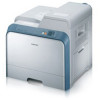Samsung CLP-650N User Manual (user Manual) (ver.1.03) (English) - Page 77
Envelopes, Labels, Envelopes with Double Side Seams, Envelopes with Adhesive Strips or Flaps
 |
UPC - 635753721393
View all Samsung CLP-650N manuals
Add to My Manuals
Save this manual to your list of manuals |
Page 77 highlights
Envelopes Envelope construction is critical. Envelope fold lines can vary considerably, not only between manufacturers, but also within a box from the same manufacturer. Successful printing on envelopes depends upon the quality of the envelopes. When selecting envelopes, consider the following factors: • Weight: The weight of the envelope paper should not exceed 90g/m2 (24lb) or jamming may occur. • Construction: Prior to printing, envelopes should lie flat with less than 6mm (0.25in.) curl, and should not contain air. • Condition: Envelopes should not be wrinkled, nicked, or otherwise damaged. • Temperature: You should use envelopes that are compatible with the heat and pressure of the printer. • Size: You should only use envelopes within the following size ranges. Minimum Multi-purpose Tray 3.5 x 5.5in. (90 x 140mm) Maximum 8.5 x 14in. (216 x 356mm) NOTES: • Use only the Multi-purpose Tray to print envelopes. • You may experience some paper jams when using any media with a length less than 140mm(5.5in.). This may be caused by paper that has been affected by environmental conditions. For optimum performance, make sure you are storing and handling the paper correctly. Please refer to "Printer and Paper Storage Environment" on page 10.3. Envelopes with Double Side Seams Double side-seam construction has vertical seams at both ends of the envelope rather than diagonal seams. This style may be more likely to wrinkle. Be sure the seam extends all the way to the corner of the envelope as illustrated below. Correct Incorrect 10.4 Specifications Envelopes with Adhesive Strips or Flaps Envelopes with a peel-off adhesive strip or with more than one flap that folds over to seal must use adhesives compatible with the heat and pressure in the printer. The extra flaps and strips might cause wrinkling, creasing, or even jams and may even damage the fuser. Envelope Margins The following gives typical address margins for a commercial #10 or DL envelope. Type of Address Minimum Return address 0.6in. (15mm) Maximum 2in. (51mm) Delivery address 2in. (51mm) 3.5in. (90mm) NOTES: • For best print quality, position margins no closer than 15mm (0.6in.) from the edges of the envelope. • Avoid printing over the area where the envelope's seams meet. Envelope Storage Proper storage of envelopes helps contribute to print quality. Envelopes should be stored flat. If air is trapped in an envelope, creating an air bubble, then the envelope may wrinkle during printing. See "Printing on Envelopes" on page 4.4. Labels CAUTION: • To avoid damaging the printer, use only labels recommended for laser printers. • To prevent serious jams, always use the Multi-purpose Tray to print labels • Never print on the same sheet of labels more than once and never print on a partial sheet of labels. When selecting labels, consider the quality of each component: • Adhesives: The adhesive material should be stable at 180°C (356°F), the printer's fusing temperature. • Arrangement: Only use labels with no exposed backing between them. Labels can peel off sheets with spaces between the labels, causing serious jams. • Curl: Prior to printing, labels must lie flat with no more than 5in. (13mm) of curl in any direction. • Condition: Do not use labels with wrinkles, bubbles, or other indications of separation. See "Printing on Labels" on page 4.5.















